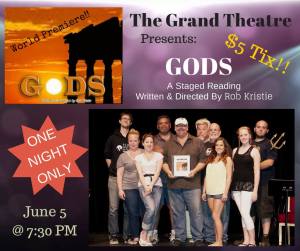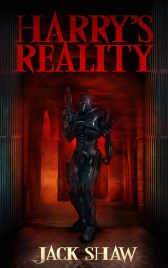 A Real Beginning for Rob Kristie’s GODS–A Mythical Musical at The Grand Theatre.
A Real Beginning for Rob Kristie’s GODS–A Mythical Musical at The Grand Theatre.
We have all seen directors cringe as they watch a production they have directed after leaving it in the hands of cast and crew. Imagine if you wrote the script… In this case, Rob Kristie wrote the book, music and lyrics for GODS—A Mythical Musical that was “performed” on the Grand Theatre’s stage in Williamstown, New Jersey.
GODS is Kristie’s second original musical. The first was entitled THE DOLL–a Raggedy Musical, which began as a staged reading at the RITZ Theater in Haddon Township, NJ. Later a full production evolved with eight performances at the Sketch Club in Woodbury, NJ, and that musical was nominated for a Perry award in 2011 for OUTSTANDING ORIGINAL MUSICAL.
Rob Kristie’s GODS was a different kind of stage reading for me in that it was a musical, and therefore contained more elements than the standard play reading. A review of a staged reading is not unheard of, but it, too, must contain the reflection and comment in a proper perspective.
GODS—MYTHICAL MUSICAL took place at the Grand to a nearly full house to see if this pared down realization of his idea resonated with an audience. While the staged reading experience with amplified acting, music, sound effects, and lights was unusual, it was necessary. Obviously if a play contains music–well, that has to be audience-tested, too. With the bigger audience, there was more opportunity for proper input. Hence, The Grand Theatre was a great venue choice.
Edith Hamilton’s Mythology—a book many of us used in school–about the Greek, Roman and Norse gods whose dalliances with humans created an exciting bridge to an immortal world inspired Kristie.
The world in which the gods operate is a little different now. While active in ancient times, the gods (all of them) exist in a passive state, coming to Earth only to observe or participate briefly without getting involved.
 As you might expect, immortal gods and mortal humans once again collide. This time it’s on a cruise ship at sea. Here, a beautiful goddess catches the eye of a handsome British performer, and they fall in love at first sight. Of course, they can never be together—or can they? How does a human prove worthy to a god(dess)? For that matter, how do any of us prove our worth to the guardians of someone we care about? Naturally, there is more, but I don’t want to spoil it for you. We must not anger the gods.
As you might expect, immortal gods and mortal humans once again collide. This time it’s on a cruise ship at sea. Here, a beautiful goddess catches the eye of a handsome British performer, and they fall in love at first sight. Of course, they can never be together—or can they? How does a human prove worthy to a god(dess)? For that matter, how do any of us prove our worth to the guardians of someone we care about? Naturally, there is more, but I don’t want to spoil it for you. We must not anger the gods.
The musical is essentially an interesting variation of “boy wins girl,” “boy loves girl and she loves him,” “girl loses boy,” and “boy gets girl back.” All that and be careful not to anger the gods.
We see the world briefly from the eyes of the gods. We see a detached but meaningful look at world society today. The characters are interesting and the music is engaging, while the story takes us back to our childhood studies of human beliefs.
Making theatre magic is not as easy as it looks…and that is because most of the productions we, audience members, attend have had the benefit of testing, and changes and/or adaptations suggested by another audience.
In this setting, the audience must create each scene in its mind while attending to the action on stage…so the experience is participatory to say the least. The actors/singers themselves have to produce art with the barest of direction, seeing their characters in a stage designer’s environment, in a production that hasn’t happened yet. However, the audience must try to do so as well. Actual productions would differ with the casting and directorial vision. In Rob Kristie’s GODS –A MYTHICAL MUSICAL, there appears to be plenty of room for production style variations. That’s a good thing.
Kristie has created an extra character, a narrator, to tell the audience the stage directions. Accidental or not, the narrator, played by Glenn Fennimore, was quite entertaining and presented an intriguing element in the theatrical storytelling not unlike the mythology itself. Nine actors/singers, including Fennimore: Jeff Blomquist, Cierra Olmo, Danielle Dipillo, Lani Campagno, Chuck Gill, Steve Pracilio, Amanda Peacock and Tyrone Fuimaono gave enthusiastic, finished performances on stage.
The music was consistent and lively with catchy lyrics, although a couple musical numbers and dialogue among the gods seemed to slow down the action in the second act. The first act ended in a “chirp,” rather than an exciting change. A tableau of frozen character action might have achieved a stronger effect or depth of change. Or, a stronger song. Or, any number of theatrical devices. Perhaps, even the opposite of a tableau—a dance number—might achieve the same success.
It takes a staged reading to see those very comments emerge.
Although all the songs had merit, one number in particular stood out for me. It had a country feel to it rather than the typical “musical theatre” sound. By itself, it seems out of place, but such a good song deserves to be heard, and maybe more with same “difference.” Then, the GODS musical would be distinctive indeed.
Theatre is a collaborative art that has to start somewhere. Somewhere is not always a theatre. It is often a bare room with actors sitting around a table with a small audience looking on. Kristie has done better than that in having both staged readings in established theatres and by doing so was able to add more elements, i.e., sound effects, music and some lighting. Ultimately it will be he who will weigh and make the decisions to sublimate his art.
A staged reading is the first time an audience sees the beginning of theatre magic. It works without the benefit of direction, blocking, creating and setting, costuming and lighting a stage—essentially the minimum of what appears to be the beginnings of a theatrical production. If the “reading” is a musical as this one, the instruments are basic as well. From this, the creator solicits feedback intended to improve the work. A brave move, but it is the next step.
As an actor who has collaborated on several original plays and screenplays, I can tell you that bringing an original work to the stage takes nerve, but it is an exhilarating and innovative time for all involved. Even for the audience. Harder work is ahead.
Of course, this is not really the beginning for a production; the creator has decided it is time for audience input. Long before that, friends and family members gave their input. Often, it takes years for the theatre artist’s conception to fruition on stage even in its barest of forms.
It’s good to see this one made it. The best is yet to come.
For more on GODS – A Mythical Musical, check out its Face Book page.
GODS–A Mythical Musical
Written and directed by Rob Kristie
Coming soon to a theatre near you.

